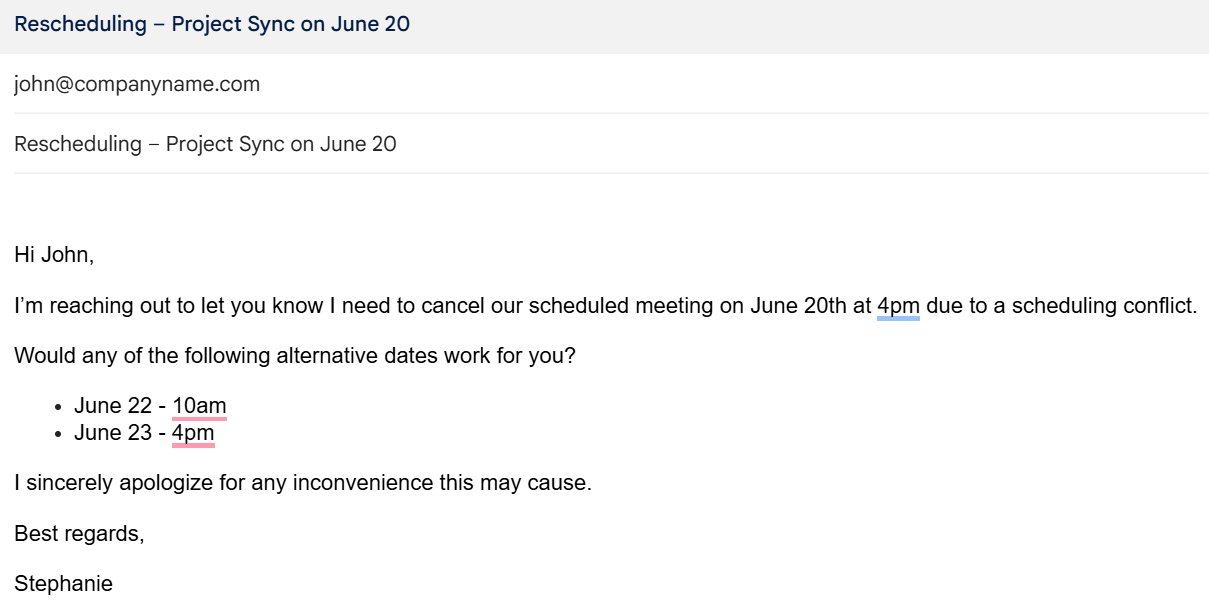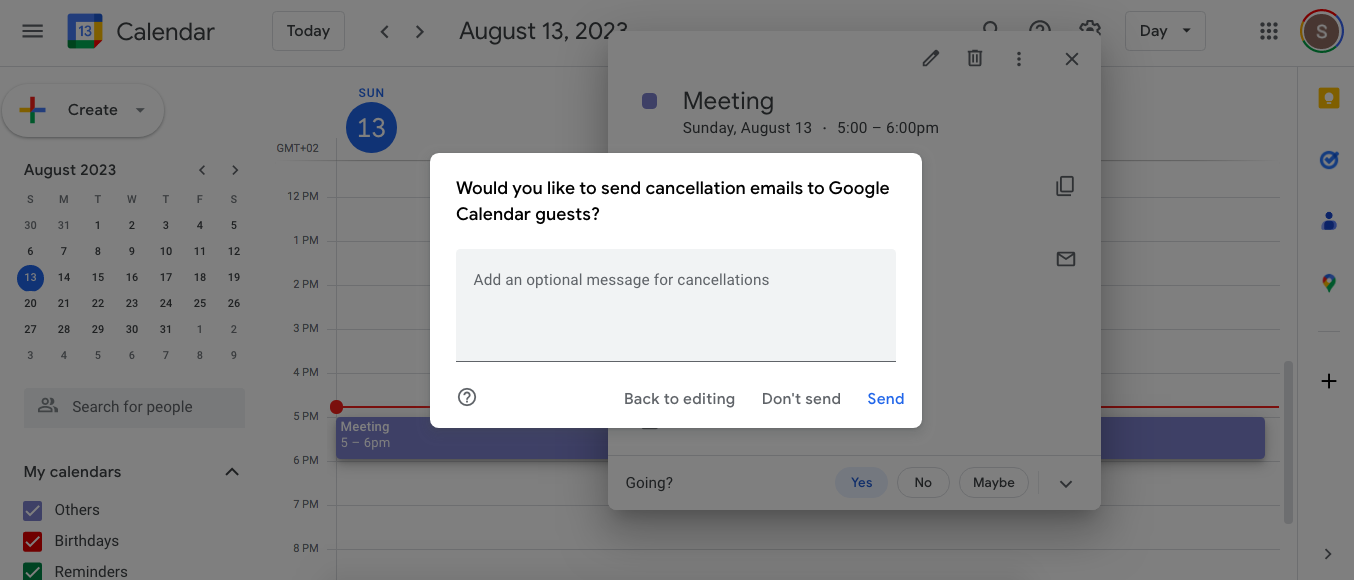How to Write a Meeting Cancel Notice (with Templates)
June 19, 2025
June 19, 2025
June 20, 2025
June 20, 2025
Sometimes, meetings just can’t happen. Maybe something urgent came up, there’s no meeting agenda yet, or maybe your internet gave up right before the call. Whatever the reason, knowing how to send a clear and respectful meeting cancellation notice can help you maintain professional relationships.
In this guide, you'll learn how to write a professional cancellation email that keeps things polite, short, and easy to understand. You'll also get templates for common situations, plus one smart tip on how to avoid cancelling in the first place.
How to Write a Meeting Cancel Notice (Politely)

If you ever need to cancel a meeting, don’t overthink it. A good meeting cancellation email is respectful, brief, and sent as early as possible. Here’s a simple step-by-step approach:
- Write a clear subject line. Let people know what the message is about right away. Examples: “Meeting Cancellation – [Meeting Name],” or “Cancelled: [Meeting Name] on [Date].”
- Greet your recipients. A simple “Hi [Name],” works just fine.
- Say you need to cancel the meeting. Use a direct sentence like “I need to cancel our scheduled meeting” or “Due to [reason], I won’t be able to attend.”
- Briefly explain why. Keep it short. Don’t overexplain—just give enough context to help others understand.
- Suggest alternative dates (if possible). Offer a new meeting date or alternative dates and times so that the conversation can move forward.
- Apologize for any inconvenience. A quick “Sorry for the inconvenience this may cause” goes a long way.
- Use a professional closing statement. End with “Best regards” or “Thanks for understanding” and your name.
Now let’s make it easier with templates you can copy. Remember to adjust the tone and add more context. You can also paste this template on ChatGPT and ask for it to be more polite or straightforward, depending on your needs.
1. Schedule Conflict Template
Subject line: Rescheduling – Project Sync on June 20
Hi [Name],
I'm writing to inform you that I need to cancel our scheduled meeting on [Date and Time] due to an unexpected scheduling conflict. [Provide reason - e.g., "with a client emergency that requires immediate attention" or "due to a family commitment that cannot be rescheduled"].
Would any of the following alternative dates work for you?
[List options]
I apologize for the inconvenience and appreciate your flexibility in rescheduling.
Best regards,
[Your Name]
2. Family Emergency Template
Subject line: Meeting Cancelled – Personal Emergency
Hi [Name],
Due to a [family/personal] emergency, I regret to inform you that I will need to cancel our meeting scheduled for [Date and Time].
I’ll follow up soon to discuss an alternative date and time as soon as the issue is resolved.
Apologies for the inconvenience caused, and thank you for understanding.
Best regards,
[Your Name]
3. Sickness Template
Subject line: Unable to Attend Today’s Meeting
Hi [Name],
I'm writing to inform you that, unfortunately, I'm feeling unwell and will need to cancel our meeting scheduled for [Date and Time].
I truly apologize for the inconvenience and short notice.
I would appreciate the opportunity to reschedule at your earliest convenience, preferably later this week or next week, depending on your availability.
If you have a calendar link, I’m happy to find a slot.
Thank you for your understanding, and I look forward to connecting with you soon.
Best regards,
[Your Name]
4. No Agenda Template
Subject line: Cancelled – No Agenda for [Meeting Name]
Hi [Name],
After reviewing our upcoming meeting scheduled for [Date and Time], I believe it would be most productive to postpone until we can establish a clear agenda with defined objectives.
This will ensure we make the best use of both our time and can address all relevant topics effectively. I'd be happy to collaborate on developing the agenda and then reschedule at your convenience.
Thank you for your understanding, and I look forward to our productive discussion once we have the framework in place.
Best regards,
[Your Name]
Pro tip: Use Tactiq to create clear agendas using AI meeting kits. It helps you create call notes templates fast, so you don’t have to cancel due to a lack of planning.
5. Tech Issues Template
Subject line: Meeting Delay – Technical Problems
Hi [Name],
I’m experiencing some unforeseen circumstances with my setup. It will take time to resolve the issue, so I unfortunately need to cancel the meeting scheduled for [Date and Time].
Let’s find a new time that works. Are you available on [alternative date]?
Thanks for your patience, and sorry for the inconvenience caused.
Best regards,
[Your Name]
Download all the meeting cancellation email templates in one doc here. Click File > Download > select your preferred file format.
Meeting Cancellation Best Practices
Canceling a meeting doesn't have to disrupt your team's flow. These practices help you send a clear and respectful meeting cancellation notice that keeps everyone informed and things moving forward.
1. Send the cancellation notice early
Timing is everything. As soon as you realize the meeting can't happen, send a cancellation email right away. This gives others time to adjust their day, especially if they need to make travel arrangements or shift priorities. Even if you’re dealing with an unexpected personal emergency, a quick message can prevent confusion. The earlier you send it, the more understanding people tend to be.
2. Use a clear subject line
A vague subject can cause your message to be ignored or misunderstood. Write a clear subject line that mentions the meeting name and the cancellation. This helps the recipient spot the update quickly in their inbox. For example: “Cancelled: Weekly Team Check-In – June 22 at 10 AM.” It sets the tone for the rest of the message and avoids unnecessary follow-up questions.
3. Keep it short and polite
You don’t need to write a long explanation. A brief explanation is usually enough. Just state the reason and show consideration for others’ time. Being polite and direct makes your message easier to read and respond to. Avoid vague phrases like “something came up.” Instead, say you're dealing with a scheduling conflict or a family emergency. Keep the focus on clarity, not just formality.
4. Offer to reschedule
If the meeting still matters, show your commitment by offering to reschedule. Suggest a few alternative dates or ask the recipient when they're available. This helps keep momentum and avoids dropping important discussions. Even if you're not ready to confirm a new meeting date, showing your intent to reconnect helps maintain professional relationships. It also takes pressure off the recipient to chase you for a follow-up.
5. Apologize for the inconvenience
A short apology helps soften the impact of your cancellation. You can say, “I apologize for any inconvenience this may cause,” or “Thanks for understanding.” It shows that you respect the time others set aside. Especially in a professional setting, a thoughtful tone helps maintain trust. Over time, people remember how you handled changes just as much as the changes themselves.
6. Use the original communication channel

If you sent the meeting request through Google Calendar, make sure to cancel the Google Calendar event there. If it were in Outlook, use that platform to cancel the Outlook meeting. This avoids duplicate messages and keeps things clear for the key participants. People rely on these tools for reminders and schedules, so updating the event directly reduces miscommunication. Always double-check that the cancellation notice has been sent and received.
7. Be mindful of tone
Tone matters more than you think. Even a quick cancel meeting email should sound respectful and clear. Avoid abrupt phrases like “Can’t make it, let’s reschedule.” Instead, keep a professional tone that reflects empathy and responsibility. This shows emotional awareness and helps with maintaining professionalism, even in last-minute changes. When done right, your message builds trust, even in your absence.
How to Use Tactiq to Help Take Meeting Notes

If your meeting can’t be canceled, let Tactiq do the heavy lifting so you can focus on the discussion. Tactiq transcribes virtual meetings and uses AI to help you take notes, generate summaries, and turn conversations into action without missing a word.
Here’s what you can do with Tactiq:
- Live Transcriptions: Tactiq starts transcribing automatically when your meeting begins, displaying real-time text so you never miss a key moment.
- AI Meeting Summaries: Get instant summaries, action items, and next steps right after your meeting ends.
- Custom Prompts & Meeting Kits: Use tailored GPT AI prompts to generate specific outputs like follow-up emails, documentation, or project updates. Save your favorite prompts and build reusable kits.
- Quick Search: Instantly find key points in your transcript using keywords or speaker names.
- AI Meeting Workflows: Automate tasks like updating your CRM, creating Jira tickets, or syncing to Notion using Tactiq’s AI-powered workflows.
- Multilingual Transcription: Transcribe meetings in 50+ languages, perfect for global teams.
- Audio and Video File Support: Upload recordings to get transcripts and AI summaries, even after the meeting ends.
Want to organize your meeting insights in a tool your team already uses? Tactiq also integrates directly with Notion, so you can send transcripts, AI summaries, and action items to your workspace in one click. You can even build your own Notion meeting note templates using Tactiq’s AI prompts, perfect for recurring check-ins or project updates.
👉 Download the free Tactiq Chrome Extension today and start turning your meetings into clear, actionable notes.
{{rt_cta_ai-convenience}}
Wrapping Up
Not every meeting goes as planned. When you need to write a meeting cancellation, doing it with clarity and care helps keep things professional and respectful. A quick message, a clear reason, and a possible new time can make a cancellation feel like a quick pause, not a disruption.
And when you can’t cancel meetings, tools like Tactiq help you stay on top of things. From transcripts to summaries to meeting workflows, you don’t have to scramble to keep up or worry about missing details.
Sometimes plans change, but with the right approach and support, you can stay in control.
Use a clear subject line, give a brief explanation, and sincerely apologize for any inconvenience. If possible, suggest alternative dates to keep the conversation moving.
Yes, but make sure it includes all the relevant details, keeps a professional tone, and sounds like you. You can also use ready-made meeting cancellation email templates to save time.
Send the cancellation email immediately using the original communication channel. Be direct, acknowledge the short notice, and offer to reschedule at a later date if possible.
Yes, or you can speed things up by using ready-made meeting cancellation email templates or an editable meeting minutes templates to guide your message.
It's best to include the following in your email: a clear subject line and greeting, a direct statement of cancellation, a brief explanation, alternative dates, an apology and a professional sign off.
Want the convenience of AI summaries?
Try Tactiq for your upcoming meeting.
Want the convenience of AI summaries?
Try Tactiq for your upcoming meeting.
Want the convenience of AI summaries?
Try Tactiq for your upcoming meeting.









